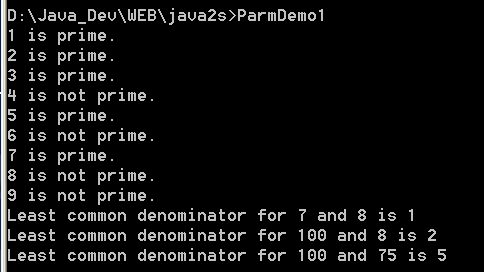Add a method that takes two arguments

/*
C#: The Complete Reference
by Herbert Schildt
Publisher: Osborne/McGraw-Hill (March 8, 2002)
ISBN: 0072134852
*/
// Add a method that takes two arguments.
using System;
class ChkNum {
// Return true if x is prime.
public bool isPrime(int x) {
for(int i=2; i < x/2 + 1; i++)
if((x %i) == 0) return false;
return true;
}
// Return the least common denominator.
public int lcd(int a, int b) {
int max;
if(isPrime(a) | isPrime(b)) return 1;
max = a < b ? a : b;
for(int i=2; i < max/2 + 1; i++)
if(((a%i) == 0) & ((b%i) == 0)) return i;
return 1;
}
}
public class ParmDemo1 {
public static void Main() {
ChkNum ob = new ChkNum();
int a, b;
for(int i=1; i < 10; i++)
if(ob.isPrime(i)) Console.WriteLine(i + " is prime.");
else Console.WriteLine(i + " is not prime.");
a = 7;
b = 8;
Console.WriteLine("Least common denominator for " +
a + " and " + b + " is " +
ob.lcd(a, b));
a = 100;
b = 8;
Console.WriteLine("Least common denominator for " +
a + " and " + b + " is " +
ob.lcd(a, b));
a = 100;
b = 75;
Console.WriteLine("Least common denominator for " +
a + " and " + b + " is " +
ob.lcd(a, b));
}
}
Related examples in the same category